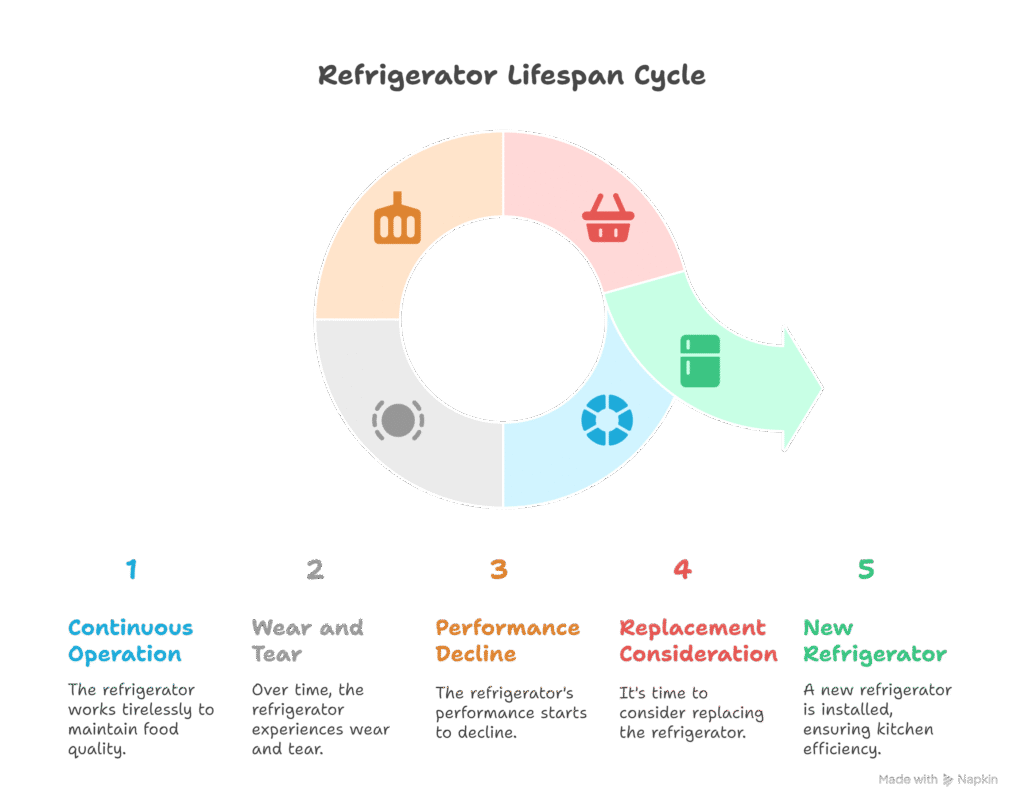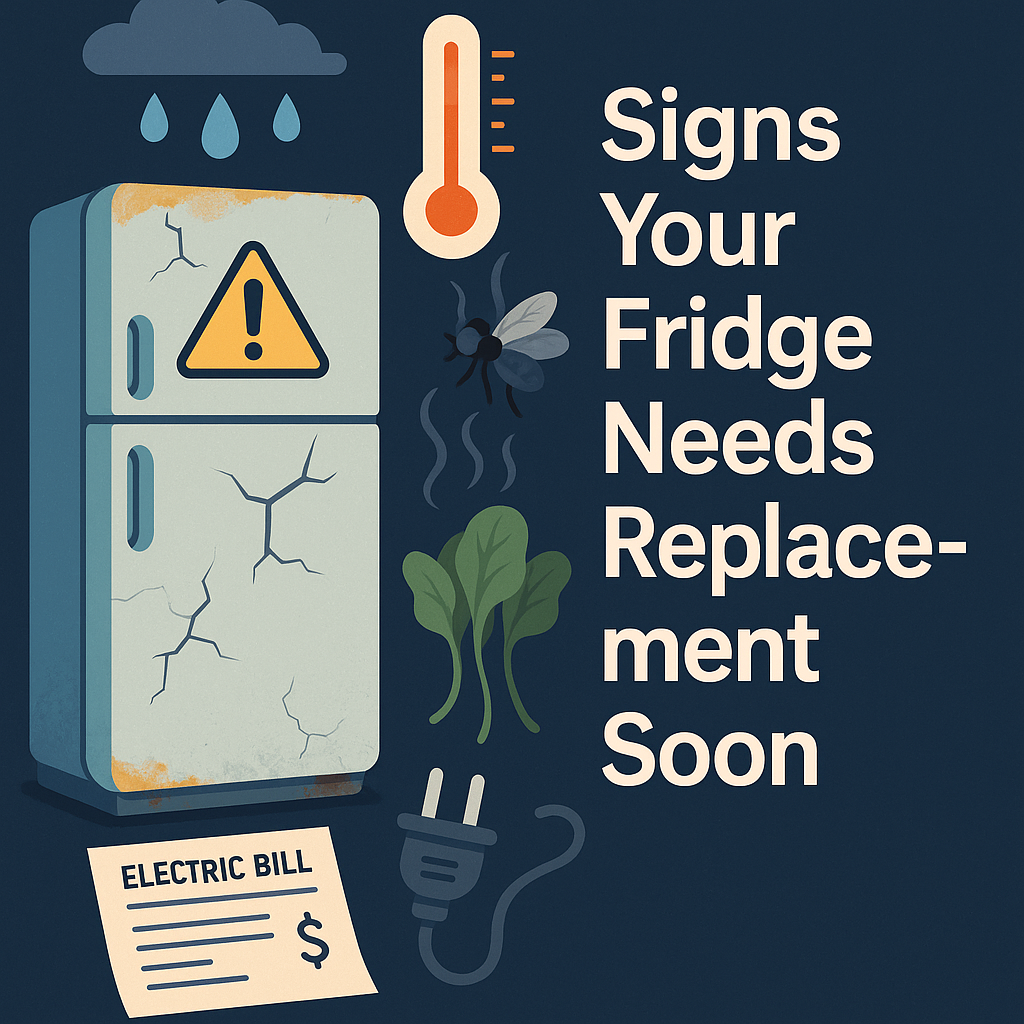Fridge Needs Replacement
When it comes to household appliances, your refrigerator is one of the most important. It keeps your food fresh, your drinks cold, and operates around the clock to ensure your kitchen runs smoothly. In fact, the refrigerator is often considered the heart of the kitchen, working tirelessly to maintain the quality of your perishables. However, like any appliance, it has a limited lifespan and Fridge Needs Replacement Soon. Understanding when your fridge is nearing the end of its life can save you from unexpected breakdowns and costly repairs. Here, we’ll explore the key indicators that it might be time to start shopping for a new refrigerator, ensuring your kitchen remains the efficient and safe haven it should be.

1. Your Fridge Isn’t Keeping Food Cold
One of the most obvious signs that your refrigerator is on its last legs is when it fails to keep your food cold. Proper cooling is essential for preventing food spoilage and maintaining food safety. If you notice that your milk spoils faster than usual or the ice cream is melting in the freezer, it might be time to investigate. A fridge that can’t maintain a consistent temperature can cause your groceries to spoil, leading to food waste and potential health risks.
What to Look For:
- Milk spoiling faster than usual
- Ice cream melting in the freezer
- Inconsistent cooling or temperature fluctuations
2. Temperature Inconsistencies
A healthy refrigerator should keep a steady temperature of around 37-40 degrees Fahrenheit. This range is crucial for slowing down bacterial growth and ensuring food longevity. If you notice fluctuations or if the temperature gauge shows a higher reading, it could be a sign of a failing compressor or thermostat. Such inconsistencies not only risk food spoilage but also increase energy consumption as the fridge works harder to stabilize temperatures.
Key Points:
- Check temperature frequently
- Potential compressor or thermostat issues
- Higher energy consumption
3. Frequent Repairs Are Costing You
If you find yourself frequently calling the repair technician, it might be more cost-effective to invest in a new fridge. Frequent breakdowns are a clear indicator that your appliance is nearing the end of its serviceable life. Each repair not only costs money but also indicates that the appliance is becoming unreliable. Over time, the cost of repairs can quickly add up, making replacement a more economical option.
Why It’s a Problem:
- Increased repair costs
- Unreliable appliance
- Disruption to daily routine
4. Condensation Inside or Outside the Fridge
Condensation inside or outside your fridge can indicate a problem. While a little bit of condensation is normal, excessive moisture suggests that your fridge isn’t cooling properly. This could be due to a broken seal or a malfunctioning cooling system. Excess moisture can also lead to mold growth, which poses health risks and can damage the interior of the fridge.
What It Means:
- Broken seals or malfunctioning cooling system
- Potential mold growth and health risks
- Damage to fridge interior
5. Water Pooling Around the Fridge
Water pools around your fridge are a definite red flag. This could be a sign of a clogged or frozen defrost drain, but it could also indicate more serious issues, such as a cracked pan or a failing water filter. Leaks can cause damage to your kitchen flooring and cabinetry, potentially leading to costly repairs. Moreover, persistent water leaks can be a breeding ground for mold and mildew, which can affect indoor air quality.
What to Check:
- Clogged or frozen defrost drain
- Cracked pan or failing water filter
- Potential damage to flooring and cabinets
6. Unusual Noises
Your fridge should operate quietly in the background. If you start hearing unusual noises like clanking, buzzing, or humming, it might be trying to tell you something. These sounds could indicate issues with the motor, compressor, or fan. Unusual noises often signal that the fridge is working harder than it should, which can lead to increased wear and tear. It’s important to address these sounds promptly, as they can quickly escalate into more significant mechanical failures if left unchecked.
Key Noises to Look Out For:
- Clanking, buzzing, or humming sounds
- Issues with motor, compressor, or fan
- Increased wear and tear
7. Loud Humming Noise
A loud humming noise could mean that your fridge is working harder than it should to maintain the correct temperature. This not only increases your energy bill but also indicates that your refrigerator might be nearing the end of its life. Persistent loud humming can be caused by a variety of issues, including a malfunctioning compressor or fan.
What to Do:
- Investigate the source of the noise
- Potential malfunctioning compressor or fan
- Addressing issues early to prevent further damage
8. Rising Energy Bills
An inefficient refrigerator can be a significant drain on your electricity. If you notice a sudden spike in your energy bills, your fridge could be the culprit. Older models or those with failing components tend to use more energy to keep your food cool. As appliances age, their efficiency naturally declines, leading to increased energy consumption.
What to Watch For:
- Unexpected spike in energy bills
- Older fridge models using more energy
- Declining efficiency with age
9. Frost Build-Up in the Freezer
While a bit of frost in the freezer is normal, excessive build-up can indicate a problem. Frost build-up can reduce storage space and make it difficult to access your frozen goods. If you find yourself defrosting your freezer more often than not, it could be due to a faulty defrost system or inadequate sealing.
Signs of a Problem:
- Excessive frost build-up
- Difficulty accessing frozen goods
- Increased energy consumption
10. Broken or Worn-Out Door Seal
The door seal, also known as the gasket, plays a critical role in maintaining the fridge’s efficiency. If the seal is cracked or not closing properly, it allows warm air to enter, leading to frost build-up and inefficient cooling. A compromised gasket can significantly impact the fridge’s performance, causing it to work harder to maintain temperature.
What to Do:
- Inspect and clean the door seal regularly
- Replace broken or worn-out gaskets
- Maintain fridge efficiency
11. Spoiled Food and Foul Odors
If your food spoils faster than it should, it’s a strong sign that your fridge isn’t doing its job. Not only is this wasteful, but it also poses health risks as spoiled food can harbor bacteria. Consistently spoiled food can indicate that the fridge is not maintaining the optimal temperature for food preservation.
What to Look For:
- Spoiled food more quickly than normal
- Foul odors in the fridge
- Inadequate cooling or temperature control
Conclusion
Knowing when to replace your fridge can save you time, money, and hassle. If you’re experiencing any of the issues mentioned, it’s likely time to consider a new appliance. Modern refrigerators come with advanced features, improved energy efficiency, and better reliability. Investing in a new fridge can enhance your kitchen’s functionality and provide peace of mind, knowing your food is stored safely and efficiently.
Shopping Tips:
- Consider energy efficiency ratings
- Look for warranty options
- Choose features that suit your lifestyle
Frequently Asked Questions (FAQs)
How do I know if my fridge is too old to repair?
If your fridge is over 10-15 years old, it may be less efficient and more prone to breakdowns. It’s often more cost-effective to replace it rather than repair it.
Can I fix my fridge myself if it’s leaking water?
Minor leaks can sometimes be fixed by checking for clogged defrost drains or faulty seals. However, if the leak persists, it’s best to consult a professional to avoid further damage.
Why is my fridge making a loud humming noise?
A loud humming noise may indicate that the motor, compressor, or fan is malfunctioning. This can cause the fridge to work harder, leading to higher energy bills and potential breakdowns.
How much does it cost to replace a refrigerator?
The cost of replacing a fridge varies depending on the model, brand, and features. On average, a basic fridge can cost between $400 to $1,500, while high-end models with advanced features may cost more.
How often should I replace my fridge?
Refrigerators typically last around 10-15 years. If your fridge is nearing this age and experiencing frequent issues, it might be time to replace it to ensure energy efficiency and food safety.





